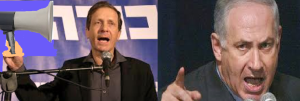Such a medium dovetails with the entire society’s primary means of expression and communication.
 Jerusalem, February 24 – Israeli candidates for prime minister have not held a debate since the 1998 elections, but incumbent Binyamin Netanyahu and Opposition leader Isaac Herzog announced today they would hold the first in a series of encounters in which the two front-runners would stand and yell at each other from behind lecterns.
Jerusalem, February 24 – Israeli candidates for prime minister have not held a debate since the 1998 elections, but incumbent Binyamin Netanyahu and Opposition leader Isaac Herzog announced today they would hold the first in a series of encounters in which the two front-runners would stand and yell at each other from behind lecterns.
National elections are scheduled to take place on March 17, and neither candidate had agreed until now on any format for an actual debate. Netanyahu has eschewed the notion of debate altogether, refusing to grant any opponents the credibility that standing on a stage with him would automatically confer; such a move may have contributed to his last electoral loss in 1998, to Ehud Barak. Herzog, on the other hand, insists on confronting only Netanyahu, and has repeatedly declined to appear with the heads of the other, smaller parties, hoping instead to position himself as the only viable alternative to the current premier. However, the idea of a simple shouting match found a receptive ear in both men’s campaigns, as such a medium dovetails with the entire society’s primary means of expression and communication.
“There’s little political risk in standing on a stage screaming at each other,” said Likud campaign coordinator Laika Banshi. “The Israeli electorate is sophisticated enough not to confuse such a scene, which occurs daily in the Knesset itself, with a serious political event whose symbolism and appearance carry real implications.”
Zionist Union officials concurred. “While a serious debate against Netanyahu would be preferable, we certainly have no problem sending Buji out there to scream and be screamed at in return,” said Herzog’s co-chair of the joint roster, Tzipi Livni. “That’s a basic part of campaigning in Israel. And driving. And crossing the street. Shopping. Using the ATM. Parking your bicycle. Ordering food. And of course, parenting.”
Other parties gave only lukewarm endorsement to the shouting match. “It certainly offers an honest picture of current political rhetoric,” acknowledged Meretz campaign manager Migdala Shenhav. “But any format that does not allow candidates from any of the non-leading parties to participate in the shouting does no service to Israeli democracy. We also have what to contribute to the cacophony of meaningless hyperbolic verbiage.”
Arab parties, the three of of which are running on a joint list, expressed ambivalence as well. “Having Netanyahu and Herzog shout at each other will certainly have little impact one way or another on our electoral fortunes, so while we’re not against the idea, we’re not exactly thrilled by it, either,” said Ahmad Tibi of Raam-Taal. “It smacks of discrimination to have two men shouting only in Hebrew when nearly a fifth of the citizens of this country speak Arabic as a first language.”
Tibi acknowledged that although unlikely, it was possible the two leading candidates would in fact conduct their frank exchange of ideas in Arabic, or Swahili, or Vulgar Latin, but it would be impossible to know, since no one would be watching or listening.




